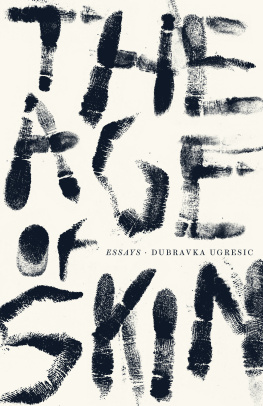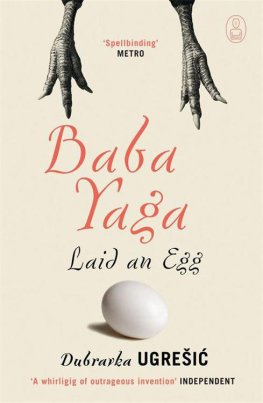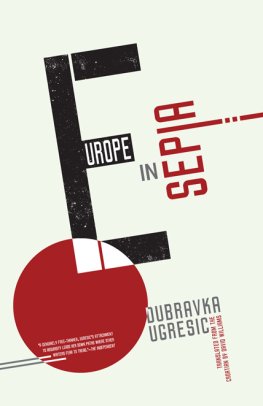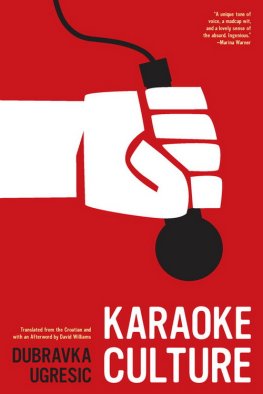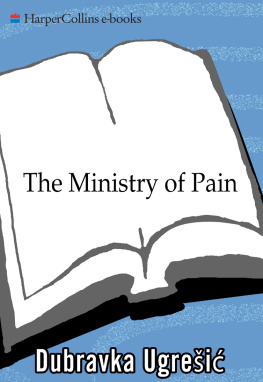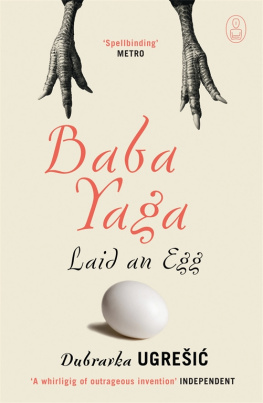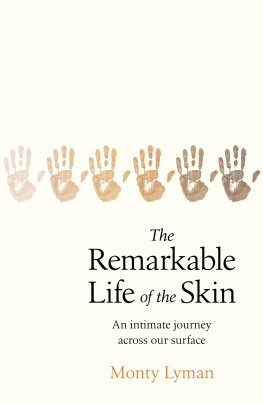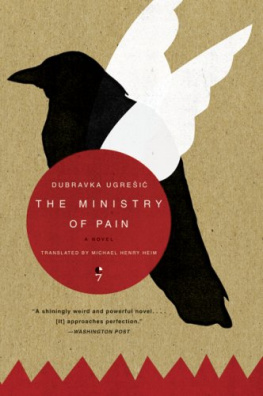Dubrakva Ugresic - The Age of Skin
Here you can read online Dubrakva Ugresic - The Age of Skin full text of the book (entire story) in english for free. Download pdf and epub, get meaning, cover and reviews about this ebook. year: 2020, publisher: Open Letter, genre: Detective and thriller. Description of the work, (preface) as well as reviews are available. Best literature library LitArk.com created for fans of good reading and offers a wide selection of genres:
Romance novel
Science fiction
Adventure
Detective
Science
History
Home and family
Prose
Art
Politics
Computer
Non-fiction
Religion
Business
Children
Humor
Choose a favorite category and find really read worthwhile books. Enjoy immersion in the world of imagination, feel the emotions of the characters or learn something new for yourself, make an fascinating discovery.
- Book:The Age of Skin
- Author:
- Publisher:Open Letter
- Genre:
- Year:2020
- Rating:5 / 5
- Favourites:Add to favourites
- Your mark:
- 100
- 1
- 2
- 3
- 4
- 5
The Age of Skin: summary, description and annotation
We offer to read an annotation, description, summary or preface (depends on what the author of the book "The Age of Skin" wrote himself). If you haven't found the necessary information about the book — write in the comments, we will try to find it.
The Age of Skin — read online for free the complete book (whole text) full work
Below is the text of the book, divided by pages. System saving the place of the last page read, allows you to conveniently read the book "The Age of Skin" online for free, without having to search again every time where you left off. Put a bookmark, and you can go to the page where you finished reading at any time.
Font size:
Interval:
Bookmark:

Like Nabokov, Ugresic affirms our ability to remember as a source for saving our moral and compassionate identity.John Balaban, Washington Post
A genuinely free-thinker, Ugresics attachment to absurdity leads her down paths where other writers fear to tread.The Independent
As long as some, like Ugresic, who can write well, do, there will be hope for the future.New Criterion
Ugresics wit is bound by no preconceived purposes, and once the story takes off, a wild freedom of association and adventurous discernment is set in motion. Ugresic dissects the social world.World Literature Today
Never has a writer been more aware of how one narrative depends on another.Joanna Walsh
Ugresic must be numbered among what Jacques Maritain called the dreamers of the true; she draws us into the dream.New York Times
Ugresic is also affecting and eloquent, in part because within her quirky, aggressively sweet plot she achieves moments of profundity and evokes the stoicism innate in such moments.Mary Gaitskill
Dubravka Ugresic is the philosopher of evil and exile, and the storyteller of many shattered lives.Charles Simic
FICTION
Baba Yaga Laid an Egg
Fox
The Ministry of Pain
Lend Me Your Character
The Museum of Unconditional Surrender
Fording the Stream of Consciousness
In the Jaws of Life and Other Stories
ESSAYS
American Fictionary
Europe in Sepia
Karaoke Culture
Nobodys Home
Thank You for Not Reading: Essays on Literary Trivia
The Culture of Lies: Antipolitical Essays
DUBRAVKA UGRESIC
Translated from the Croatian by Ellen Elias-Bursa

Copyright 2020 by Dubravka Ugresic
Translation copyright 2020 by Ellen Elias-Bursa
First edition, 2020
All rights reserved
Library of Congress Cataloging-in-Publication Data: Available.
ISBN-13: 978-1-948830-22-5 | ISBN-10: 1-948830-22-1
This project is supported in part by an award from the National Endowment for the Arts and the New York State Council on the Arts with the support of Governor Andrew M. Cuomo and the New York State Legislature.

Printed on acid-free paper in the United States of America.
Cover Design by Jack Smyth
Interior Design by Anthony Blake
Open Letter is the University of Rochesters nonprofit, literary translation press: Dewey Hall 1-219, Box 278968, Rochester, NY 14627
www.openletterbooks.org
And on his way he met a man who was, with his breath, turning a millstone. The young man stood and watched. Then he stepped closer and inquired:
What are you doing?
Im grinding up people.
Roma fairy tale
And so for a long, long time, Snow White lay there, always as fresh as shed been when alive, she still appeared to be sleeping; all her beauty remained, for she was, as ever, white as snow, red as a rose, and her hair, black as ebony.
Brothers Grimm, Snow White and the Seven Dwarves
I shudder when I hear the hackneyed (and strident) line that life writes novels. Lets be clear: if life wrote novels, thered be no such thing as fiction. Literature may be on its last legs, but its infirmity is due not to the historic ascendance of life over literature but to literatures own self-destruction, brought about through the earnest efforts of the very people who propel the literary process: the avaricious publishers, laggardly editors, wishy-washy critics, unambitious readers, and authors lacking in talent but greedy for fame. As to the relationship between literature and life, things stand, more or less, as follows: gossip lies at the heart of the literary story. We all love to know what happens to others, even what they ate for lunch. Big-time novels are, also, big-time gossip mills. Has this changed with the advent of new media? No, indeed, the appetite for gossip has only mushroomed. Gossipmongers tweet, text, like, post. Social networks are their natural habitat. Reality literaturedelving with minute detail into the private lives of celebritieshas now reached its apotheosis. The earlier hagiographies on the lives of the saints have now evolved, genre-wise, into biographies, autobiographies, and memoirs. Once the greed for gossip has been whetted, putting a stop to it is a challenge. All of us are now saints. We flay our own skin, readily expose our inner organs; each of us is on display in the shop window at the local butchers.
English has a wealth of skin-related phrases: To have thick or thin skin, get under someones skin, jump out of ones skin, escape by the skin of your teeth, save your skin, strip down to the bare skin, and sayings such as beautys only skin-deep, no skin off my nose, no skin in the game, skinflint, skinny-dipping Skin is intimate, and, as far as intimacy goes, it takes precedence over metaphors of the heart. While our heart is poised to love all of humanity, we are loved only by our skin.
The Slavic languages do not have distinct words for the two kinds of skin like English (skin, leather), or German (haut, leder), or Dutch (huid, leer), or Spanish (piel, cuero) or, for example, Italian (pelle, cuoio). Many Slavs use the same word for both our bodys envelope and the material used to cobble shoes. Perhaps this absence of linguistic diversity has to do with differences in civilization? Might this lapse in articulation be the source of the obsession with genuine leather among a certain class of shoppers?
Ex-Yugoslavs in the second half of the twentieth century traveled to neighboring Italy, to Trieste, to buy shoes, purses, and jackets (made, of course, of genuine leather). Later they trotted off to more affordable Istanbul and lugged leather clothing back to the Yugoslav flea markets. A man wearing a leather jacket and a gold chain around his neck was generally seen as a good catch. When the popularity of genuine leather was at its peak, the feeling was that a man wearing a leather jacket was ready for anything. Soon, cheap imitations eroded the appeal of genuine leather, and human males and females wearing leather jackets slipped for a time into the socially stigmatized human niche: trash. And leather slipped into a leather subculture where it became the empress, a fetish, a cult.
Like all intellectuals with a humanistic bent, I drop to my knees before science. There is no one who can wow me more than mathematicians, physicists, astronomers, physicians, and statisticians; nobody can place things in their true perspective the way they can. So, an article was recently published in the Croatian press with the provocative title, Countries with a fat population, like Croatia, are a burden to Earth. Apparently, the United States holds first place as the fattest country in the world, with Croatia coming in third, right behind Kuwait. Among the skinniest are the Asian and African countries, with North Korea in first place. The article quotes a recent study published in the journal
Font size:
Interval:
Bookmark:
Similar books «The Age of Skin»
Look at similar books to The Age of Skin. We have selected literature similar in name and meaning in the hope of providing readers with more options to find new, interesting, not yet read works.
Discussion, reviews of the book The Age of Skin and just readers' own opinions. Leave your comments, write what you think about the work, its meaning or the main characters. Specify what exactly you liked and what you didn't like, and why you think so.

